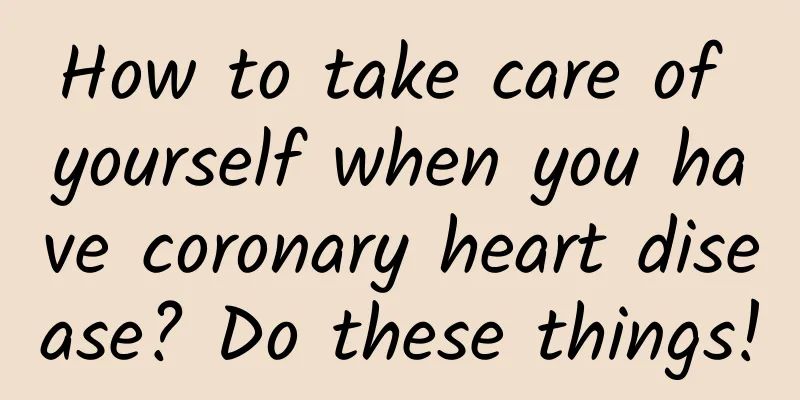How to take care of yourself when you have coronary heart disease? Do these things!

|
Coronary heart disease is a heart disease that is usually caused by the narrowing or blockage of the coronary arteries. The coronary arteries are the main blood vessels that supply blood to the heart. When these blood vessels become narrowed or blocked, it restricts the blood supply to the heart, causing a lack of oxygen to the heart, which can cause symptoms such as myocardial infarction or angina. 1. Causes of coronary heart disease Coronary heart disease is a heart disease caused by the narrowing or blockage of the coronary arteries. The coronary arteries are the main blood vessels supplying blood to the heart. If there are too many lipids and cholesterol in the inner layer of the arteries, atherosclerotic plaques will form, leading to narrowing and blockage of the arteries. The causes of coronary heart disease can be divided into two categories: one is irreversible factors, such as genetics, age, gender, etc.; the other is reversible factors, such as high blood pressure, high blood lipids, smoking, drinking, obesity, lack of exercise, etc. These reversible factors are crucial for the prevention and control of coronary heart disease. The picture comes from the Internet 2. Symptoms of Coronary Heart Disease Symptoms of coronary heart disease are caused by insufficient blood supply to the heart or myocardial ischemia, which manifests as chest pain or discomfort, and in severe cases can even lead to myocardial infarction or sudden death. The severity and duration of symptoms may vary from person to person, but usually worsen as the disease progresses. 1. Chest pain The most common symptom of coronary heart disease is chest pain, also known as angina. Chest pain usually manifests as a feeling of oppression, heaviness, tightness, pain or discomfort, located behind the sternum, in front of the heart or in the left shoulder and arm. The degree and duration of pain vary from person to person and can last from a few seconds to tens of minutes. The pain may worsen during exercise or emotional excitement and can be relieved by resting or taking nitroglycerin.
2. Difficulty breathing Patients with coronary heart disease may experience dyspnea due to myocardial ischemia or heart failure. This symptom usually occurs during strenuous exercise or physical activity and is relieved by rest. Dyspnea may be caused by pulmonary congestion or alveolar effusion. 3. Nausea and vomiting People with coronary heart disease may experience nausea or vomiting. This symptom usually occurs in the early stages of myocardial infarction and may be caused by the heart failure caused by myocardial infarction. 4. Fatigue and weakness Patients with coronary heart disease may feel tired and weak. This symptom usually appears in the early stages of myocardial ischemia or heart failure, and may be caused by disorders in the body's metabolism and energy utilization. 5. Tachycardia or arrhythmia Patients with coronary heart disease may experience symptoms of tachycardia or arrhythmia. These symptoms may be caused by myocardial ischemia or heart failure. Some arrhythmias may lead to thrombosis and increase the risk of myocardial infarction.
In summary, the symptoms of coronary heart disease mainly include chest pain, dyspnea, nausea and vomiting, fatigue and weakness, and tachycardia or arrhythmia. These symptoms can occur alone or simultaneously, and may also vary from person to person. In particular, chest pain is the most common symptom. If persistent chest pain occurs, you should seek medical attention in time to avoid serious consequences. 3. Common nursing measures for coronary heart disease Coronary heart disease is a cardiovascular disease. With the change of lifestyle and the increase of environmental pollution, the incidence rate is also increasing. Coronary heart disease care refers to the prevention, treatment and management of patients with coronary heart disease in order to alleviate symptoms and improve the quality of life. This article will focus on the common nursing measures for coronary heart disease.
1. Lifestyle management Lifestyle management is the basis for the treatment and prevention of coronary heart disease, including healthy diet, moderate exercise, smoking cessation, and alcohol restriction. Healthy diet means eating more vegetables, fruits, whole grains, and low-fat dairy products, and limiting high-fat, high-salt, and high-cholesterol foods. Moderate exercise can reduce weight, lower blood lipids and blood sugar, and enhance heart function. Quitting smoking can reduce the burden on the heart and prevent heart disease. Limiting alcohol can lower blood pressure and blood lipids and protect heart health. 2. Drug treatment Drug therapy is an important treatment for patients with coronary heart disease, including analgesics, anticoagulants, antiplatelets and lipid-lowering drugs. Analgesics can relieve pain during angina and myocardial infarction. Anticoagulants can reduce thrombosis and prevent heart disease. Antiplatelets can prevent thrombosis and heart disease. Lipid-lowering drugs can lower cholesterol and blood lipids to protect heart health. 3. Psychological counseling During the treatment process, patients with coronary heart disease often experience psychological problems, such as depression and anxiety, due to the pain of the disease and worries and fears about the future. If these problems are not properly handled, they will seriously affect the patient's quality of life and treatment effect. Therefore, psychological counseling is very important in the care of coronary heart disease. Patients need to understand their condition, accept and actively participate in treatment. At the same time, doctors and family members should also give patients enough understanding and care to help them reduce mental stress and enhance their ability to resist the disease. 4. Regular follow-up Coronary heart disease is a chronic disease that requires long-term treatment. During the treatment process, patients need to have regular follow-up visits, electrocardiograms, blood lipids, blood pressure and other tests to detect changes in the condition and make adjustments in a timely manner. At the same time, patients also need to follow the doctor's treatment recommendations, maintain good living habits, and report changes in their condition to the doctor at any time. In this way, they can better control their condition and reduce the occurrence of complications. The picture comes from the Internet 5. Preventive measures In addition to the above care measures, prevention of coronary heart disease is also very important. Here are some preventive measures: (1) Maintain good living habits, such as quitting smoking and limiting alcohol consumption, exercising appropriately, and maintaining a healthy weight. (2) Maintain mental health and learn to relieve stress and emotions. (3) Have regular health checks to promptly detect and treat chronic diseases, such as hypertension and diabetes. (4) Take medication as prescribed by your doctor and control risk factors, such as hypertension and high blood lipids. In short, coronary heart disease care is a systematic and comprehensive work that requires the coordination of multiple links to better protect the health of patients. In the nursing process, doctors, family members and patients themselves must work together to establish a close cooperative relationship to help patients recover as soon as possible. |
Recommend
What is the best way to delay ovarian aging?
The ovaries are a very important part of every wo...
What are the symptoms of uterine cold in traditional Chinese medicine
Uterine cold is the most common gynecological dis...
Will having myopia surgery cause presbyopia to develop earlier?
People who have undergone eyeglass removal surger...
How can I improve my wife’s sexual apathy?
Both men and women may experience sexual indiffer...
Menstrual period is very little and dark, almost no
Generally, when people notice that their menstrua...
What is the city tree of Sanya? Can I drive to Sanya by myself?
The hottest time in Sanya is from May to August. ...
How many months does the belly get bigger during pregnancy?
If you observe, you will find that many pregnant ...
If your child doesn't grow tall, an orthopedic doctor can help you.
This is the 3839th article of Da Yi Xiao Hu As an...
After a few days of weaning, you can express it
Weaning a baby is also a very painful thing. On t...
What is the best medicine for bacterial vaginitis?
Bacterial vaginitis is bacterial vaginitis, which...
Can I eat garlic during confinement?
There will be a one-month confinement period afte...
What should women pay attention to when they are first
First pregnancy The first-born child is the smart...
Brief discussion: Surveying and mapping and geophysical surveying industry on heatstroke prevention and health care during the dog days of summer
The dog days of summer are coming. For the field ...
Polycystic ovary syndrome is more likely to cause twin pregnancy
Polycystic ovary is a very common condition in da...
How to do fetal heart monitoring?
If the baby in the belly is small, not developing...









